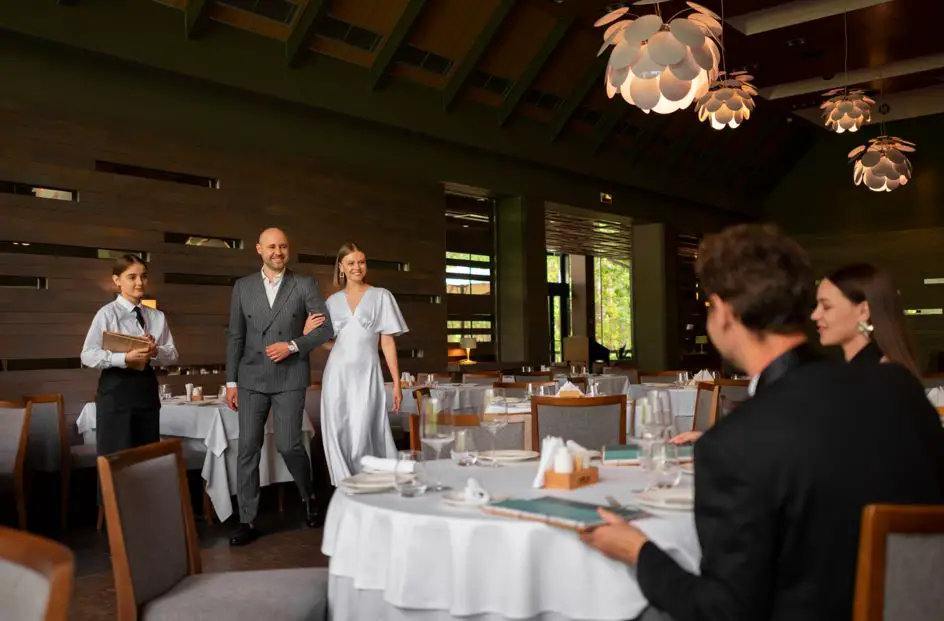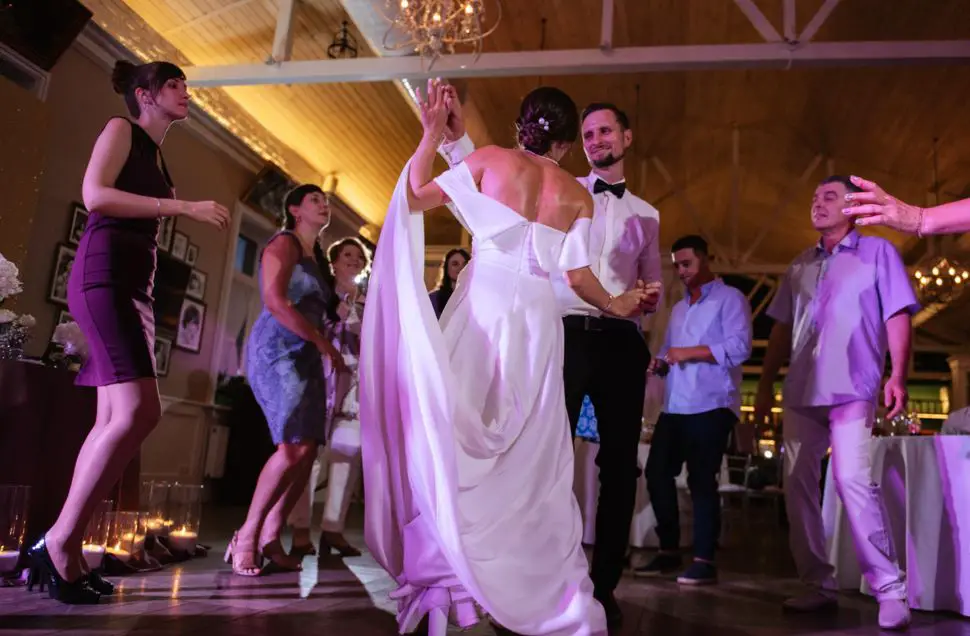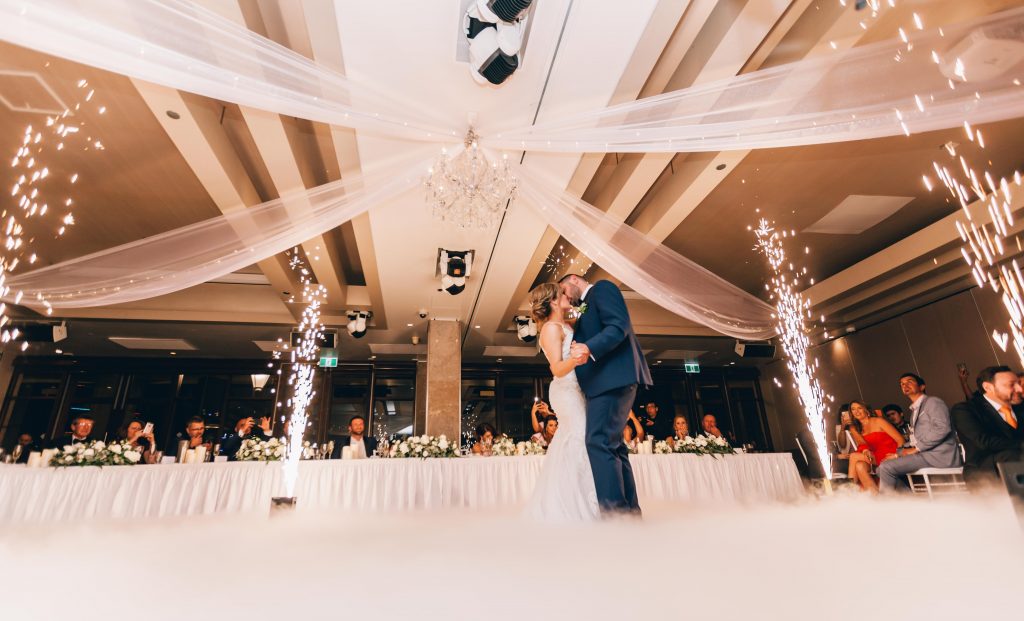When planning a wedding, one must consider two key parts: the ceremony and the reception. While the ceremony marks the official union between the couple, the reception is a celebratory event where family and friends gather to rejoice. Both aspects of the wedding require thoughtful planning, but the reception often takes centre stage due to its complexity and the many elements involved.
In this article, we’ll explore the typical duration of a wedding reception, how to structure the timeline, and what to consider when making the most of the time available for your celebration.
Let’s get straight to the point
A typical wedding reception lasts around five to six hours, including the ceremony, cocktail hour, dinner, speeches, and dancing. The ceremony usually takes about an hour, with four to five hours dedicated to the reception.
Events like speeches, dancing, and dinner can quickly fill the reception timeline. A well-organized four-hour reception can work for smaller weddings, especially with simplified activities.
Longer receptions can lead to increased costs, guest fatigue, and potential issues with intoxicated guests. Careful planning ensures that your wedding reception is enjoyable and memorable.
The Duration of a Wedding Reception

Weddings rarely extend beyond six hours, including the ceremony, reception, photography sessions, and any special events you’ve planned. On average, a wedding ceremony lasts about an hour, while the reception typically runs for four to five hours. When planning, consider the location and whether the ceremony and reception are happening at the same venue, as this can influence your timeline. If guests must travel between locations, it can shorten the reception time.
Key Points to Remember:
- Total Duration: Most weddings, from start to finish, last about five to six hours.
- Ceremony Time: The ceremony usually takes about one hour, leaving four to five hours for the reception.
- Venue and Travel: If the ceremony and reception are held in different locations, factor in travel time for your guests.
Elements of a Wedding Reception
You may wonder how to fill the time during a reception, especially if you have a five-hour window. However, several traditional elements will take up much of that time. Below are some key activities commonly found in wedding receptions and how much time they typically consume.
1. Cocktail Hour (1 Hour):
After the ceremony, many couples have a cocktail hour, during which guests can enjoy drinks and light appetisers. The wedding party is often taking photos during this time. This hour helps transition guests from the ceremony to the reception while keeping them entertained.
2. Speeches and Dancing (30-45 Minutes):
Speeches are a major part of most wedding receptions, often given by the best man, maid of honour, and couple's parents. After the speeches, there may be formal dances, such as the couple's first dance and the parent-child dances. Though no single speech or dance takes long, they collectively require about 30 to 45 minutes.
3. Dinner and Dessert (1 Hour):
Whether your meal is served plated or buffet-style, it will take time for everyone to be served and to finish eating. Dessert is typically served after dinner, and the wedding cake is cut. This is another period when the dance floor tends to be less crowded as guests focus on eating.
4. Open Dancing and Mingling (Remaining Time):
After these formalities, the remaining time is dedicated to dancing, mingling, and enjoying the reception. Guests are free to socialise, take part in any other planned activities, and celebrate with the couple.
Completing these key events will use up most of the available time. Once all these elements are included, a five-hour reception may feel short.
Is Four Hours Too Short for a Reception?
A four-hour reception might seem short for some weddings, especially smaller ones. However, with careful planning,a successful event can be structured in this timeframe. If you’re working with limited time, here are some tips to ensure things go smoothly and avoid potential chaos.
Tips for Shorter Receptions:
- Limit the Guest List: Smaller weddings tend to run more smoothly and require less time for socialising. A guest list of 50 or fewer people can make it easier to fit everything into four hours.
- Post a Clear Timeline: Let your guests know the schedule of events by posting it at the entrance of the reception area. This helps keep everyone on track and ensures they know what to expect.
- Keep It Simple: Avoid adding unnecessary complexity to your reception. Things like games, slideshows, or skits can eat up valuable time. Stick to the essentials like dining, speeches, and dancing.
- First Look Photos: If you want to save time after the ceremony, consider doing a “first look” photo session before the event. This allows you to take photos early to head straight to the reception after the ceremony.
By simplifying your reception and being strategic with your schedule, a four-hour reception can be as enjoyable and memorable as a longer one.
How Long Should a Wedding Reception Last?
The ideal length for a wedding reception can vary based on several factors, such as the number of guests and the nature of the event. A well-organised reception can easily last up to six hours if you want to include all the traditional elements—ceremony, cocktails, dinner, and dancing. However, a five-hour reception may be more than enough for more intimate weddings with fewer guests.
Factors That Affect Reception Length:
- Guest Age: If many of your guests are younger, they may be able to stay up later, extending the party beyond the traditional five or six hours.
- Number of Guests: Larger guest lists typically require more time, as there are more people to serve and more social interactions to manage.
Grand Finale: Ending the Night

Some couples enjoy ending their reception with a grand farewell, whether a big dance or a staged farewell photo. If you plan a farewell photo or video, consider scheduling it before the night's end, especially if you have a large guest list. As the reception winds down, many guests may leave, and a staged farewell ensures you get the photo you want with plenty of people present.
Alternatively, if you’re planning a grand finale dance, ensure enough guests are present to make it a memorable moment. This is usually not an issue for a large wedding, but it’s something to consider for smaller receptions.
Potential Drawbacks of an All-Night Reception
While a longer reception can be enjoyable, there are some potential downsides to extending the celebration too long.
1. Five Hours of Open Bar:
Guests who have access to an open bar for five or more hours may become overly intoxicated. This can lead to accidents, arguments, or other unwanted situations. It’s important to monitor alcohol consumption and consider providing transportation for guests to get home safely.
2. Increased Costs:
The longer your reception lasts, the more you'll need to pay for staff time. Chefs, waiters, bartenders, photographers, and musicians are all on the clock for the duration of the event. Extending the reception can significantly increase costs, so consider this when planning.
3. Guest Fatigue:
Weddings are long days, especially for the couple and close family members who have been preparing and celebrating since early morning. Guests may tire after five or six hours of partying, and the event's energy may dip. Keep this in mind if you’re planning a longer reception.
Conclusion
Generally, most wedding receptions last around five to six hours, with the ceremony taking up the first hour and the remaining time dedicated to cocktails, dinner, speeches, and dancing. When planning your reception, it’s important to consider how you’ll use the available time and whether a shorter or longer event suits your needs.
For smaller weddings or those on a tighter schedule, a four-hour reception can be plenty, as long as you keep the event simple and well-organised. On the other hand, if you have a larger guest list and want to include more activities, a five- or six-hour reception might be more appropriate.
By being mindful of the timeline, ensuring your guests are entertained, and balancing the formalities with fun, you can create a wedding reception that is both enjoyable and memorable for everyone involved. And if you’re not quite ready for the party to end when the reception wraps up, consider continuing the celebration at a local bar or hotel with your closest friends and family!
FAQs About Weddings
So, Exactly How Long Is a Wedding Reception? All told, your entire wedding event will span about six hours—for example, an evening wedding that begins at 5 p.m will end at around 11 p.m. This includes the following major events: Your wedding ceremony, which typically lasts about 30 minutes.
If the venue doesn't have a set start time, they may have a strict end time. You can expect a more conservative reception venue to end the party around 11 pm or midnight depending on a few different factors, including: what they have booked the next day.
It's certainly fine to leave before the end of the reception. If at all possible, stay until after the cutting of the cake. Regardless, simply make sure you get some face time with the couple to visit and offer your best wishes. If you've done this, it's not necessary to say goodbye.
The order of entrance is: parents of the bride, parents of the groom, ushers with bridesmaids, flower girl and ring bearer, special guests, best man, maid/matron of honor, bride and groom. In addition, go over how to pronounce the wedding party's names with the emcee.
You may choose to open your gifts at the reception. This is usually more appropriate at small weddings where the guests are close friends and family. At larger weddings, opening gifts is usually done sometime after the wedding.

